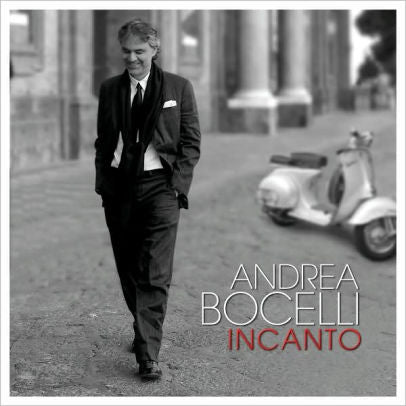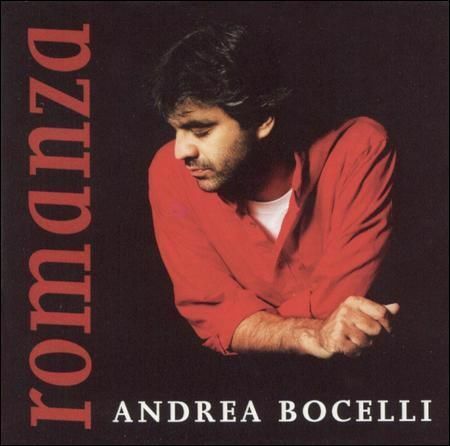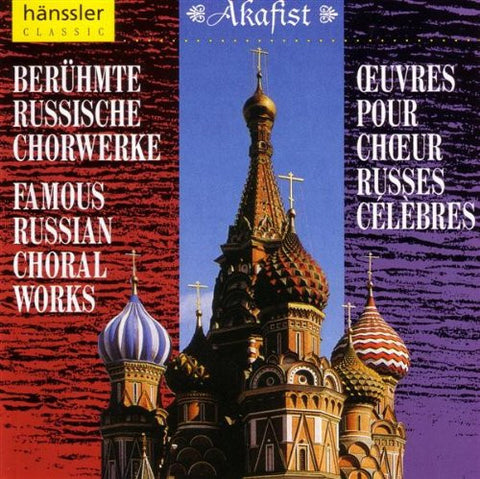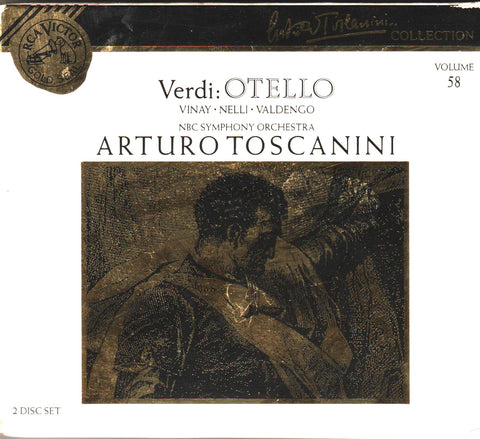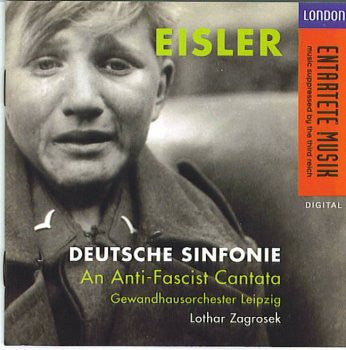
Hanns Eisler - Deutsche Sinfonie (German)
Deutsche Sinfonie
By Hanns Eisler
. Very ++ Good Condition. (Includes CD, jewel case, and original artwork inserts, all in very good condition)
Performed by various vocal soloists with the Ernst Senff Chor Berlin and the Gewandhausorchester Leipzig conducted by Lothar Zagrosek. Part of London's Entartete Musik [Degenerate Music, music suppressed by the Third Reich] series. At various times dubbed an "anti-fascist cantata," a "concentration camp symphony" and an "anti-Hitler symphony," this soul-moving, humanist, provocative and important work for chorus, soloists and orchestra is in 11 sections, written for the most part from 1935 through 1957. Eight of its movements have words by Berthold Brecht, with the eighth movement also containing portions from Ignazio Silone's novel Bread and Wine (1936), who was called a "renegade" by the USSR after he condemned the show trials as a "slaughtering of the opposition." The Symphony's history can also be viewed as biographical of the composer's tumultuous life: The final movement is an "Epilogue," a plea to save children from the literal cold and the coldness of man's previous acts.
Hanns Eisler (1898-1962) is probably best-known for his communist politics, and as a composer, best-known for his lieder, many of them settings of poems by Bertolt Brecht. This "Deutsche Symphonie op. 50" is his longest work, and it too features Brecht's incomparable poetry as well as Eisler's uniquely populist 12-tone music.
Eisler was from Vienna, and studied with Schoenberg after serving in the Great War, during the period when Schoenberg developed 12-tone music. Eisler remained committed to the form throughout his life, but adapted it to music that was aimed at a mass audience of workers. Eisler broke with Schoenberg and became actively involved with the German DKP (Communist Party) in Berlin during the Weimar Republic years when the Left battled the Nazis as they grew in strength. Eisler fled Germany in 1933 when the Nazis seized power. He began the "Deutsche Symphonie" in 1935, originally centered on two Brecht poems: "To the fighters in the concentration camps" and "Burial of the trouble-maker in a zinc coffin." It was originally sub-titled "The Concentration Camp Symphony." The vocal parts were finished by 1937, but Eisler continued to add parts and change the structure. Two instrumental movements were added, including the the 11-minute "Allegro for orchestra" that follows the climactic "Arbeiterkantate (Song of the class enemy)," and so it was not finally completed until 1957, and first performed in 1959 in the DDR (East Germany), where Eisler settled after being run out of America in 1947 by McCarthy's witch-hunt.
The "Deutsche Sinfonie" is a great and powerful work, but one clearly of another time. It takes time to enter the world of its creators, the apocalyptic world of fascism and the militant fight against it. When Eisler began composing the work he was in exile, tirelessly agitating against the Nazi regime. His music had been rooted among the workers, and he utilized popular forms. This of course no longer comes across at all. It is interesting to speculate as to whether Eisler would have turned to the use of rock music as a vehicle for his political music had he lived on into the rock era. There is a tension in Eisler's music and his life between his lofty intellectual ambition and his fierce ethical commitment to social justice. But the "Deutsche Sinfonie" has power, and it culminates in the "Song of the class enemy," a 15-minute movement with a fierce, moving libretto by Brecht and a stunning melodic score by Eisler.
Unfortunately this is a disappointing performance. It is the first one I heard, and some time passed before I decided to try another recording, which was *much* better and convinced me that the problem here is with the performance and not with the composition. This disc was recorded for Decca in 1995 in Leipzig by a former-DDR orchestra, the Gewandhausorchester Leipzig, with Lothar Zagrosek conducting, and the Ernst Senff Chor of Berlin, led by Sigurd Brauns. It is difficult to identify exactly what it is that goes wrong -- the timing is very similar to that of the much better Berlin Classics performance by the Rundfunk Sinfonieorchester Berlin led by Max Pommer, recorded in 1987. But it seems as though Zagrosek and his forces are trying too hard, and the result is that it sounds affected and distorted. The earlier recording, from the DDR before the Wall fell, sounds more classical, more restrained, and in this case less is more. The playing also sounds more precise, and the singing is more natural, more like a workers' choir instead of an operatic choir.
All in all I would strongly recommend the Berlin Classics recording over this one. It is one of those cases where you might not realize you were listening to one of the great works of the 20th century if you heard the wrong recording. There is one crucial advantage to this Decca disc, though -- it includes the libretto in English. The power of the work is lost without Brecht's great poetry, and the Berlin Classics disc has only German. So if you take my advice and buy the Berlin Classics disc, you are going to need to find the libretto somewhere!
For more Eisler, or as an alternative introduction, I strongly recommend Heiner Goebbels's assembly of his music called Eislermaterial (see my review), which contains several of the songs he wrote based on Brecht's poems, as well as several instrumental works, all woven together.
Track List
1 Eisler: Deutsche Sinfonie, Op.50 - Präludium
by Hendrikje Wangemann & Ernst Senff Chor & Gewandhausorchester Leipzig & Lothar Zagrosek
2 Eisler: Deutsche Sinfonie, Op.50 - An die Kämpfer in den Konzentrationslagern
by Annette Markert and Ernst Senff Chor and Gewandhausorchester Leipzig and Lothar Zagrosek
3 Eisler: Deutsche Sinfonie, Op.50 - Etüde für Orchester
by Gewandhausorchester Leipzig and Lothar Zagrosek
4 Eisler: Deutsche Sinfonie, Op.50 - Erinnerung (Potsdam)
by Matthias Goerne & Ernst Senff Chor & Gewandhausorchester Leipzig & Lothar Zagrosek
5 Eisler: Deutsche Sinfonie, Op.50 - In Sonnenburg
by Annette Markert & Matthias Goerne & Gewandhausorchester Leipzig & Lothar Zagrosek
6 Eisler: Deutsche Sinfonie, Op.50 - Intermezzo für Orchester
by Gewandhausorchester Leipzig and Lothar Zagrosek
7 Eisler: Deutsche Sinfonie, Op.50 - Begräbnis des Hetzers im Zinksarg
by Peter Lika & Annette Markert & Ernst Senff Chor & Gewandhausorchester Leipzig & Lothar Zagrosek
8 Eisler: Deutsche Sinfonie, Op.50 - Bauernkantate
by Peter Lika & Volker Schwarz & Ernst Senff Chor & Gewandhausorchester Leipzig & Lothar Zagrosek
9 Eisler: Deutsche Sinfonie, Op.50 - Arbeiterkantate
by Annette Markert & Matthias Goerne & Volker Schwarz & Ernst Senff Chor & Gewandhausorchester Leipzig & Lothar Zagrosek
10 Eisler: Deutsche Sinfonie, Op.50 - Allegro für Orchester
by Gewandhausorchester Leipzig and Lothar Zagrosek
11 Eisler: Deutsche Sinfonie, Op.50 - Epilog
by Hendrikje Wangemann & Ernst Senff Chor & Gewandhausorchester Leipzig & Lothar Zagrosek

